- Home
- A. C. Crispin
Pirates of the Caribbean: The Price of Freedom
Pirates of the Caribbean: The Price of Freedom Read online
Copyright © 2011 Disney Enterprises, Inc. All rights reserved. Published by Disney Editions, an imprint of Disney Book Group. No part of this book may be reproduced or transmitted in any form or by any means, electronic or mechanical, including photocopying, recording, or by any information storage and retrieval system, without written permission from the publisher.
For information address Disney Editions, 114 Fifth Avenue, New York, New York 10011-5690.
Editorial Director: Wendy Lefkon
Associate Editor: Jessica Ward
This book’s producers would like to thank Mark Amundsen, Jennifer Eastwood, Brent Ford, Susan Gerber, Marielle Henault, Winnie Ho, Scott Piehl, Jon Rogers, Judi Smith, and Marybeth Tregarthen
ISBN 978-1-4231-5251-4
Table of Contents
Acknowledgments
Historical
Prologue
Chapter One
Chapter Two
Chapter Three
Chapter Four
Chapter Five
Chapter Six
Chapter Seven
Chapter Eight
Chapter Nine
Chapter Ten
Chapter Eleven
Chapter Twelve
Chapter Thirteen
Chapter Fourteen
Chapter Fifteen
Chapter Sixteen
Chapter Seventeen
Chapter Eighteen
Chapter Nineteen
Epilogue
ALSO BY A. C. CRISPIN
The Han Solo Trilogy
The Paradise Snare
The Hutt Gambit
Rebel Dawn
StarBridge Series
StarBridge
Silent Dances
Shadow World
Serpent’s Gift
Silent Songs
Ancestor’s World
Voices of Chaos
Dedication
This book is dedicated with affection, respect, and gratitude to my longtime friend and fellow writer, Barbara Mertz (Elizabeth Peters).
Barbara’s “Amelia Peabody” mysteries taught me to love Egypt and Kush, and it was in her adventure/mystery The Last Camel Died at Noon that I first read the legend of Zerzura. Two years ago, when I reread the following lines from the novel, the final pieces of my story fell into place:
“But Zerzura is mentioned in other sources; the name probably derives from the Arabic zarzar, meaning sparrow, so Zerzura is ‘the place of the little birds.’” (The speaker is her renowned fictional Egyptologist, Radcliffe Emerson; the emphasis is mine.)
Acknowledgments
Few authors can write a book in a vacuum, and I’m certainly not one of them. The Price of Freedom was an ambitious project, three years in the creation and writing. During that time I had a lot of help. With the caveat that any mistakes contained herein are my own, I’d like to thank the following:
My primary beta reader: Victoria Strauss, friend, fellow fantasy author, and Writer Beware partner, who brainstormed, read drafts, listened, counseled, and critiqued. It’s no exaggeration to say that this book would never have been completed without her help. Thanks, Vic.
My primary nautical resource and adviser, Steve Osmanski. I count myself fortunate that Steve finds going over the smallest details relating to nautical history, pirates, and the sailing of square riggers fun. Thanks, Steve. (Oh and thank you, Mary, for allowing me to “borrow” your husband during all those long evening phone calls!)
My husband, Michael Capobianco, who listened to me and brainstormed during innumerable walks, plus made dinner and handled housekeeping chores for months on end. I’m lucky to be married to a fellow writer, because only writers understand.
My fellow writer and editor Josephine Grayson, who faithfully read each chapter and made many useful suggestions, along with my fellow fantasy writer and traveling companion, Paula Volsky, who read the almost complete manuscript and helped me by pointing out anachronistic expressions that had to go.
My friend Barbara Mertz, Ph.D., who lent me books about the Two Lands, and answered questions about various subjects, such as about how to properly address a pharaoh. It was from Barbara that I learned to love reading about Egypt and Kush.
My friend Sonia James, who read the manuscript and made several suggestions for improvement, including keeping Jack from consigning the wrong sailor to the brig.
Benerson Little, author of several excellent books on pirates, particularly The Sea Rover’s Practice, who helped with information about various piratical topics, particularly swords and duels to the death.
Captain Linda Dunn of the schooner Farewell (a.k.a. “Captain Calypso” of the jolly pirate ship Fearless, in and around Baltimore’s Inner Harbor and Fells Point). Three years ago, Captain Dunn spent hours aboard the frigate USS Constellation giving me an amazing tour, and allowing me to watch very closely as she fired off the cannon. Thanks, Linda! May your powder always stay dry.
Former Captain Bob Brittain, and current Captain (then Chief Mate) Tanya Banks-Christensen of Maryland’s antique recreation tall ship, Sultana. They, and the Sultana’s crew, took us on a memorable Chesapeake cruise from Chestertown to Annapolis, and patiently answered dozens of questions, as well as allowing us to heave on the lines and wind up the capstan.
Captain Lauren Morgens and her crew of the Kalmar Nyckel, Delaware’s antique recreation tall ship, who also answered dozens of questions very patiently, and allowed me to explore her ship from bow to stern (except she wouldn’t let me climb the rigging, darn it!). Captain Morgens explained the true meaning of the command “make fast the bunt gaskets!” and made me promise to use it correctly in this book. (Which I did, Cap’n!)
Victoria Thompson, for information on the proper address for British peers, and Larry R. Kotkin, Ph.D., for discussions on pirate psychology.
The librarians of the College of Southern Maryland for long-term book loan, and the librarians of the Southern Maryland Public Library System, particularly the Charlotte Hall branch, for searching out and ordering innumerable books via interlibrary loan.
The staff of the National Museum of African Art museum store, who helped me acquire a very hard-to-get book on the archeological dig in the real Kerma, which is located in what is now Sudan.
My friend Mark Fischer, who toured the USS Constellation with me, and provided information on eighteenth-century sailing vessels and weaponry.
The reenactors, docents, and staff of Colonial Williamsburg, Jamestown, and Yorktown for information on life in the eighteenth century, as well as letting me actually pick up and aim some period weapons.
For creating the Pirates of the Caribbean universe, I would be remiss if I did not mention Disney Studios, Jerry Bruckheimer, screenwriters Terry Rossio and Ted Elliott, as well as the hundreds of cast and crew members who helped create and film the POTC universe, bringing it all to life so vibrantly. Sometimes it’s fun to play in someone else’s sandbox, and this was a rich, flamboyant, and extremely creative “sandbox.”
Thanks also go to Hans Zimmer, for writing those rousing film scores. I played them a lot to get into the mood to write.
And, of course, a very grateful thank you to Johnny Depp, for his unique and amazing abilities as an actor in bringing the character of Jack Sparrow (excuse me! Captain Jack Sparrow!) to life with such vivid panache.
I had two dedicated and talented Disney Editions editors while I worked on The Price of Freedom:
Jody Revenson, whose creative vision realized that POTC fans wanted “more Jack” and oversaw the conception, storyline creation, and initial launch of this “Captain Jack” prequel. Many thanks, Jody.
Jessie Wa
rd, who brought the project to fruition, month by month, chapter by chapter, scene by scene, down and dirty in the trenches. Writers need editors, trust me on this! Thank you, Jessie.
Three people who are, sadly, no longer with us helped inspire much of this book:
My father, Captain George A. Tickell, who taught me to sail and love the sea.
Lewis Moon, who patiently helped me develop the story and stick to my writing schedule.
Robbie Greenberger (1998–2008), son of my friends Bob and Deb Greenberger. Robbie lost his fight with leukemia in August 2008. He was a wonderful young man, with a mop of golden curls, who loved pirates and Pirates of the Caribbean. He is sorely missed by many.
Brief Historical Note
Readers who are interested in pirates, square-riggers, the early eighteenth century, and ancient Kerma may be interested to know that my instructions in writing this novel were to “stick to historical fact, unless it conflicts with established Pirates of the Caribbean continuity.” I made a faithful effort to do this.
The city of ancient Kerma really existed, located close to the third cataract of the Nile, in the country now called Sudan. The legend of Zerzura is a “real” legend, though the magical island lying off the coast of Western Africa is my own creation.
For the purposes of the story, I also created the island of New Avalon, because I needed an island in that spot, and none of the existing ones were big enough or had the rich soil needed to grow sugarcane.
For information about how real pirates lived, fought, and sailed, I recommend the following books: The Sea Rover’s Practice and The Buccaneer’s Realm, by Benerson Little, Under the Black Flag by David Cordingly, and The Complete Idiot’s Guide to Pirates, by Gail Selinger with W. Thomas Smith, Jr.
At this point I have a whole shelf of pirate books, but those four were the ones I found myself using the most consistently.
—Ann C. Crispin
Prologue
Zerzura: The Lost City
THE PHARAOH AWOKE WITH THE LIGHT of the full moon shining on his face, knowing that he had just spoken with his god. His god was named Apedemak, and in the temple renderings, he had the body of a man, but the face of the king of beasts. He was the high god of the people of Kerma, Pharaoh Taharka’s island kingdom…an island hidden from the outside world behind a barrier of powerful spells, cloaked in fog and illusion, lying off the coast of the continent men now called Africa.
Taharka rose from his bed, his mind filled with the power of Apedemak’s words, words delivered to him in a dream so vivid its images still seemed more real than the waking world. In the corner, the slave whose responsibility it was to keep the overhead frond-fan spinning, to draw in the cooler ocean breezes of the night, started in surprise, gazing questioningly at his master. Taharka shook his head at the man, wordlessly waving him back.
Moving quickly, he removed a short kilt from one of clothing chests lining the wall of his bedchamber. Donning the simple garment, the pharaoh belted it around his waist. The white linen of the kilt appeared doubly light against his mahogany skin. Taharka was nearly fifty, yet his body was as strong and muscular as it had been when he was a youth. Ignoring the elaborately beaded and braided wigs sitting on their stands, the pharaoh left his shaven head bare. He finished his abbreviated toilette by sliding his feet into everyday sandals barely trimmed with gold.
The pharaoh left the royal bedchamber, with its walls showing scenes of royal family life. He needed no light-bearer to illumine his path. The moonlight was so strong one could almost discern the vivid colors of the painted images and the lotus-topped columns.
Taharka’s sandals made faint swishing sounds against the cool stone floors as he walked slowly down the hall to the first of his children’s chambers. There, as he had known he would, he found his queen, Tiyy. She was sitting at the bedside of their youngest son, Prince Aniba, gently stroking his brow and murmuring to him, as the six-year-old prince’s nursemaid carefully sponged the child’s bared chest with cool water. Taharka winced when he saw the marks of his little son’s ribs beneath his skin. The boy had fallen sick with this feverish wasting illness nearly a month ago, and he was clearly losing the battle. Last week, without telling his queen, Taharka had quietly given orders to have a small royal tomb chiseled from the cliffs behind the palace, close to the tombs already carved for himself, his queen, and his two elder children, Prince Shabako and Princess Amenirdis.
As he heard his father’s soft step, the child turned his head, and his lips curved upward in a weak smile. “Father,” he whispered.
Taharka bent down and kissed his son’s cheek, feeling dry heat against his lips. The fever was not high, but it was relentless, and slowly, slowly, it was burning away the young prince’s life. It was not proper for a pharaoh to display despair, or for a father to show fear, so Taharka was careful not to reveal his reaction as he straightened, smiling down at his youngest. “My boy,” he said softly. “Did you eat all of the soup your mother prepared with her own hands? You need your strength.”
Little Prince Aniba nodded solemnly. “Almost all,” he assured his father, with a quick sideways glance at his mother…a look that begged her not to reveal that he lied.
Queen Tiyy smiled lovingly at her son and nodded agreement. “He did very well, husband.”
The pharaoh nodded. “Good, good,” he said. “Soon you will be well, and we shall go together in my chariot to the royal preserve to see the lions. You shall ride with me, and you may help me drive my horses!”
For a second the child’s wan features brightened into a genuine smile, as a flash of the real Prince Aniba showed through the wasted flesh. “Oh, yes, Father!” he said. “You will let me hold the reins? And we can see the lions?”
“You have my word as pharaoh that we will do it as soon as you are strong enough, my son,” Taharka said, touching the sacred bracelet that he never removed, the broad golden wristlet that was incised with the stylized head of a lion, symbol of Apedemak and the royal house of Kerma. The pale green gems that traced the lion’s head had come from the Heart of Zerzura, the sacred stone lying in the palm of the golden statue of Apedemak that stood far below the earth in the heart of the ancient labyrinth. The chamber at the heart of the labyrinth contained the island’s greatest material treasures: gold, gems, and sacred texts detailing the story of their people’s journey from their ancient homeland of Kush, millennia ago. But those worldly treasures paled in comparison to the Heart of Zerzura itself. Without the magical powers of the Heart, Kerma would be no more. The gem pulsed with the power imbued in it by the god himself.
Prince Aniba’s dark eyes shone in the faint light cast by the oil lamps as he saw his father take this sacred oath. “I cannot wait, Father!”
“Then hurry and get well, my son,” Taharka replied. “But to do that, you will need your rest. Can you close your eyes and sleep now?”
The little boy nodded. His eyelids were growing heavy; even the smallest exertion tired him. His parents and the nursemaid watched in silence as the little prince fell asleep.
Taharka glanced at his queen. “We need to talk,” he said softly. “Come.” Tiyy rose slowly, stiff from sitting so long and half-faint from exhaustion. Taharka caught her arm to steady her. The queen glanced worriedly at her son, clearly reluctant to leave him for even a moment. For who knew how many more moments she would have with him?
“Menhutep will care for him,” Taharka assured his wife. “She loves him as if he were her own.”
The nursemaid nodded agreement. “You need rest, Royal Lady. I shall keep watch, and will summon you at the slightest change in the prince’s condition.”
Tiyy’s shoulders suddenly sagged, and she gave in, allowing her husband to lead her from the sick chamber. The pharaoh put an arm around her slighter form, steadying her as he guided her through the living quarters of the royal palace, faintly lit by oil lamps tended by the slaves, but even more brightly illumined by the moonlight through the floor-to-ceiling windows desig
ned to capture the faintest of the ocean breezes in this hot climate. As they reached the end of the private wing of the palace, he turned her, and they stepped out onto a balcony overlooking Zerzura, the Shining City. Below them lay the great harbor, with moonlight gleaming on the waves. They stood side by side, Taharka’s arm still protectively around his wife’s shoulders, gazing out at their domain.
Finally Queen Tiyy roused herself from her sad reverie and looked up at her husband. Tenderly he touched her cheek, his fingers brushing lightly over her tightly curled hair, cropped short into a dark aureole to facilitate wearing her royal wigs. Her eyes, enhanced with the traditional kohl, were large and the color of onyx as they searched his features intently. “Something is different about you, my king. What has happened?”
Taharka nodded. His queen was as perceptive as she was wise. Looking down at her, seeing her lovely but strained features, he summoned his courage and resolve. It is the only way that our son might be saved.…
“I dreamed tonight,” he said slowly. “And in my dream Apedemak spoke to me and told me what I must do.”
Queen Tiyy’s eyes widened. “Tell me this dream, husband.”
Taharka closed his own eyes, the better to recall every detail. “I dreamed that I was driving my chariot along the beach. The waves rolled in and splashed my chariot wheels. My horses plunged along, their hooves flinging up sand and surf. I could taste the salt on my lips. Ra cast his golden rays down from the sky, and it seemed that the beach had no end. It was a moment of great joy.”
The pharaoh took a deep breath. “Then, suddenly, in the way of dreams, everything changed. Before me there was a great wall of stone, a cliff so sheer and high there was no climbing it. I fought to slow the horses, lest we crash into it. I brought them to a halt barely in time. As I turned them, thinking to go back, I saw that there was another cliff behind me. I was hemmed in between the cliffs and the sea. There was nowhere to go. As I hesitated, trying to decide what to do, I heard Aniba calling me. ‘Father…’ he wailed. ‘Help me!’”

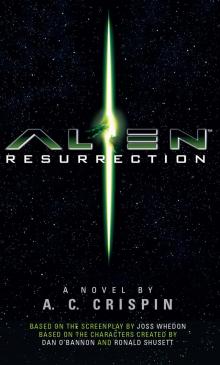 Alien Resurrection
Alien Resurrection Star Wars - The Han Solo Trilogy - Rebel Dawn
Star Wars - The Han Solo Trilogy - Rebel Dawn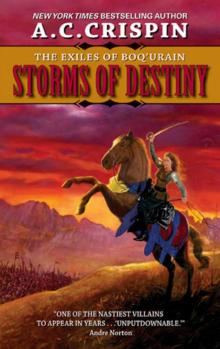 Storms of Destiny
Storms of Destiny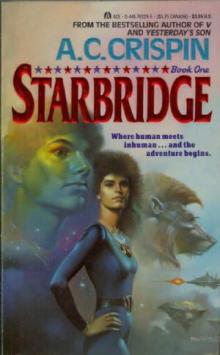 Starbridge
Starbridge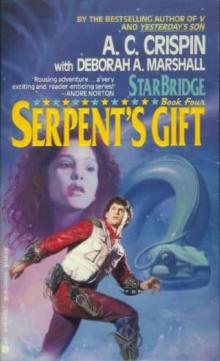 Serpent's Gift
Serpent's Gift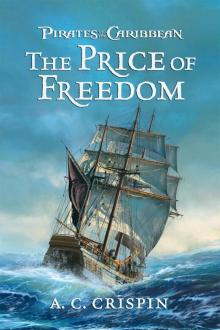 Pirates of the Caribbean: The Price of Freedom
Pirates of the Caribbean: The Price of Freedom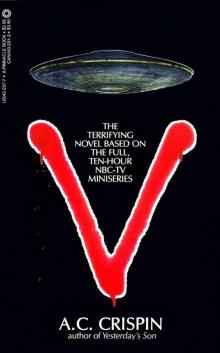 V01 - V
V01 - V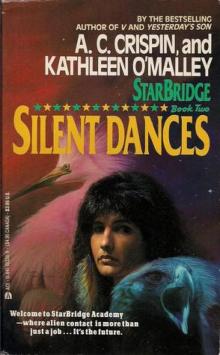 Silent Dances
Silent Dances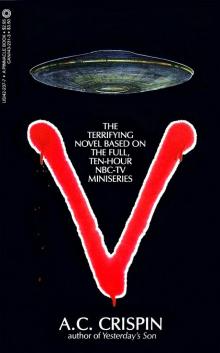 V
V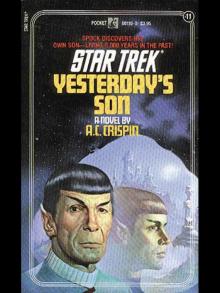 Yesterday's Son
Yesterday's Son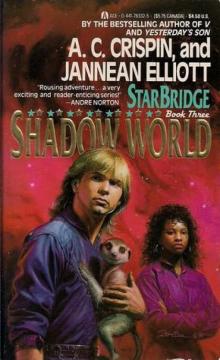 Shadow World
Shadow World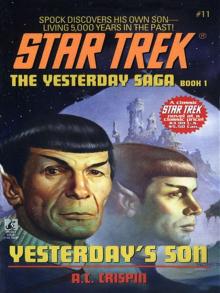 STAR TREK: TOS #11 - The Yesterday Saga I - Yesterday's Son
STAR TREK: TOS #11 - The Yesterday Saga I - Yesterday's Son Star Wars - Han Solo Trilogy - The Paradise Snare
Star Wars - Han Solo Trilogy - The Paradise Snare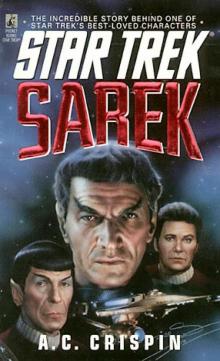 Star Trek - Sarek
Star Trek - Sarek Star Wars: The Han Solo Trilogy I: The Paradise Snare
Star Wars: The Han Solo Trilogy I: The Paradise Snare